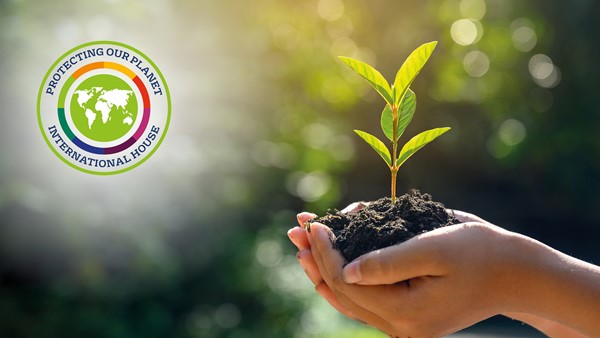International House schools are in a fantastic position as educators to encourage sustainable behaviour from students and staff. Not only can we include global sustainability topics in the curricula, but we can nudge, persuade, and encourage both students and staff to change their own behaviour while also changing our own.
Firstly, let’s take a step back. Virtually everybody accepts that they shouldn’t use those single use plastics, they shouldn’t burn all that energy by leaving lights switched on when rooms are empty, and they shouldn’t buy extra food that they then have to throw away. But we all still do these things accidentally to some extent or another. So, we all need reminders and a little nudge in the right direction.
What works, and what can we as IH schools do about it? Here are three ideas!
Use social influence
Humans are group animals. We are influenced by what the people around us do (psychologists would call it following social norms).
If we can establish publicly visible and accepted behaviour, then more people around us (our students and our staff) are likely to adopt that behaviour as well. It is a positive win win.
So, for example, telling staff how much their colleagues are switching to sustainable transport (walking, bicycle, public transport, or electric vehicles) is more effective at getting them to change, rather than just saying that those alternatives are available. Similarly, with students, explaining that a certain percentage of the last group walked to school should encourage this cohort to do the same – or better.
Putting notices on the walls in the staffroom saying how much paper teachers are saving or recycling will prompt others to do the same. And recording “last year this school saved 30kg of CO2 by switching off lights in empty classrooms” will encourage people to switch the light off when they leave.
If you can inject some healthy competition, so much the better. If IH Wherever has reduced their plastic use by stopping giving out single use plastic marketing freebies, why can’t you?
Your social media channels could be a good way to communicate these actions to your staff and students.
Use feedback and incentives
Creating positive associations with doing anything is a powerful incentive to repeat it. In other words give somebody a pat on the back for doing the right thing, and they will be more likely to do it again. A simple way to do this is through rewards – the best recycler of the year, the best project for a community activity, the teacher who had the best ideas for reducing needless food waste.
If you tell people the positive impact of the things you are doing, that will incentivise similar behaviour. For example,
- We’ve recycled 600kg of waste this year – that is a huge amount less in landfill.
- We’ve saved 20,000 litres of water last year with dual flush toilets. (You might be in a country where water is not a scarce resource, but it’s costly in terms of energy to treat and supply clean water to every home – around 800kg of CO2 per home each year!).
Don’t accept token efforts
Woo hoo! Somebody recycled the milk carton once last month. Token acts are not good enough. We’ve all been recycling for donkeys’ years – probably longer than some of your students have been alive. It is no longer sufficient.
We are ambitious to make sustainable behaviour the norm. So, recycling the milk carton is OK as long as you now do it every time. And if you can encourage somebody to make a personal commitment to always recycle, that is even better. Having informative posters in the staffroom or near the bin and recycling area will help to encourage people to recycle more and correctly.
We want to encourage a meaningful commitment to changing behaviour.
And remember to look at the bigger picture. If somebody is worrying about whether to recycle their yoghurt pots, they should really be looking at something more important to lower their overall carbon footprint.
Talk to the heart and the brain
The business we are in – language education – is about supporting our students to achieve their goals and ambitions. We already connect with them on an emotional level.
Tapping into people’s feelings of hope and pride about the future of their planet, and the communities that you share with them, is not hard.
Being overly dramatic about the end of the world apocalypse is futile, but if you can offer concrete information and discuss what the world could lose you will connect with them.
We’ll change our behaviour not only because our head tells us to, but because our heart tells us to.




